|
Da Boot Sports 8/11/2021 By: Terrill J. Weil Today's Q & A session is with former LSU wide receiver Tony Moss. Moss was a Tiger from 1985-1989. He was recruited by Head Coach Bill Arnsparger as a running back, but was asked to change positions and play wide receiver. Moss saw the field occasionally during his redshirt freshmen and sophomore seasons, but became a full time starter in his final two years. His speed, great hands, and moves after a catch was an incredible thing to watch. He left LSU as the team's 3rd all-time leading receiver with 2,196 yards receiving on 132 catches and 16 touchdowns. Q - What is your favorite food? Tony - It's a combination of things. My mother is Philippine so I like some of her dishes, which is Lumpia and her fried rice is really great. Pepper steak was my favorite, especially when I was in college. I like Louisiana dishes. It's really a combination of things. I like food. It's all my favorite. Q - What is your favorite movie? Tony - That's a good question. Growing up and when I was in college it was The Predator. Now I'm into the Marvel movies. I enjoy watching them and I enjoy all their series. Q - Who is your favorite actor? Tony - I really don't have one. I have a few that I like, The Rock and Denzel Washington. I enjoy the kind of movies that they make. Action, crime, suspense. Q - Who is your favorite music artist/group? Tony - The older I've gotten I listen to modern gospel, Christian music. I like listening to Jazz and R&B music. Q - Who is your favorite athlete? Tony - Being a sports guy, I watch all sports. I watch a lot of golf, and of course football, basketball, and baseball. I'm all over. I Really don't have one favorite person. The Olympics are going on right now so I'm watching a lot of that. Q - Which sports teams do you like to follow? Tony - I'm a Saints and LSU Tiger fan. NBA, I like Golden State. Then as far as baseball, I'm a Yankees fan. Q - I see that you have Bossier City as your home town. Is that where you were born and raised? Tony - No sir. Actually I didn't move to Bossier until 1981. My father was in the Air Force so I traveled all over the world. I was born in the Philippines at Clark Air Force Base. Like I mentioned, my mother is Philippine. I'm half Philippine, half African American. My father is from Indianapolis, Indiana. Prior to moving to Louisiana I was in Germany for three and a half years until I got into high school. That's when we moved to Bossier City and I started attending Bossier High. Q - At what age did you start playing organized sports? Tony - I've been playing since around the age of seven. Before we moved to Germany, I was in Missouri at Whiteman Air Force Base and I started there. Prior to that I started playing sand lot, living room, and in the snow football with my older cousins in Indianapolis. That's when football started to become my first love. Q - When you were a little boy what did you want to grow up to be? Tony - It was always my dream to make it to the NFL and be a football player. Q - When you were in high school at Bossier High, did you play multiple sports? Tony - Yes. I played football, basketball, and baseball. Q - Is there any personal or team accomplishments that you would like to mention? Tony - I actually was All-City in all three sports. I made All-State in football and Honorable Mention All-State in basketball. We didn't win any kind of championships. In football I started my freshmen year and we went 0-10, 1-9, 2-8, and 4-6 my whole career at Bossier High. I did have a good career carrying the ball. I broke the city/parish rushing record that was held for like 30 years back then. Since then its been broken several times. I started out as a running back, but then they moved me to quarterback to run the Veer for two years. Then after a coaching change I went back to running back to run out of the I-formation. I rushed for 1,500 yards my senior year. Q - Tell us about your recruiting process? Tony - Being my size, I was only 5'8" 160lbs, most colleges didn't see me as a tailback. They didn't rank us by stars back then, they called us Blue Chips. Picayune use to have their Blue Chip Top 12 in the State and I was listed in that. I think eight of us from that list went to LSU. A few were, myself, Tommy Hodson, Clint James, Jamie Bice, and Kenny Davidson. I received a lot of letters. They started coming my junior year. I believe the first letter I ever received was from Arkansas. The smaller school were sending me a lot letters like Northwestern, Northeastern, and Tulane. The only SEC schools I got something from was Ole Miss, Mississippi State, and LSU. Recruiters began to come watch me play during my senior year. LSU kept recruiting me throughout my entire senior year and was probably one of the larger schools who were recruiting me. Even after I committed to LSU a lot of the smaller in-State schools were trying to change my mind, telling me that I was going to be the small fish in a large pond at a big school and wouldn't get any playing time. Tulane recruited me hard. I got a lot of phone calls from them trying to get me to go to New Orleans. Q - What made you choose LSU over all the other schools who recruited you? Tony - Coach Arnsparger came to my house for a home visit. He told me that I had a good opportunity to go there and do what I do. He felt that I would be able to get on the playing field. I went to visit LSU, loved the atmosphere, and loved the opportunity to play on national television. It was also a place where I could see myself continue to work on my goal of making it to the NFL. Q - So how did the move from running back to wide receiver happen at LSU? Tony - I went there and grinded and worked hard. Getting onto the field was my first goal. During my true freshmen year, we had Dalton Hilliard and some other great running backs. Then after that season, they recruited four more top running backs including Harvey Williams, Eddie Fuller, and Alvin Lee. That's when they decided to ask me to move to receiver. They sat me down and basically told me what I needed to do to get on the field. Without much growth and at my size, they just didn't see me becoming big enough to become a fulltime running back. They felt that if worked hard enough at receiver that I could stay out on the field. Q - Can you tell us about Head Coach Bill Arnsparger? Tony - He was a great guy. With Coach Arnsparger you began to realize that college football was more of a business then just playing football. He would sit down with you and talk to you like a man. He really didn't micromanage but he wanted you to go out there and do what you're suppose to do. He let his coaches coach and he managed. He was pretty good at that. As a coach, we got along really well. I think he really liked me. When I was still a running back during my redshirt year, I would run on the scout team all the time. Bill would always make me the goal line running back and have me jump over the top. I think he really liked that. He would always tell me. "Jump up there, get up in the air Tony." ... He just wanted to see me get jacked up I guess.... But we were good. I remember when we had our last reunion, both he and his wife still knew me and still knew all our names. That was pretty impressive after the time they had been away combined with all the people they have met. He was a real good guy. I really enjoyed playing for him. Q - How did you and the team handle the news that Arnsparger was leaving to become the AD at Florida and the hiring of Mike Archer as his replacement? Tony - It was a big surprise, but the transition was so smooth. All we did was loose our head coach. Archer stepped in as the head coach, but our position coaches were all still there. It wasn't a big drastic change to me or anybody else. That 1987 team after Bill left was probably one of the best teams we ever had at LSU. We went 10-1-1. We shouldn't of tied with Ohio State and Tommy missed the Alabama game which we barely lost with Mickey at quarterback. That was a heck of a team. Great defense. Good players on both sides of the ball. Q - Tell us a little about Coach Archer? There had to be a huge difference between he and Bill? Tony - With Coach Archer things were a little more upbeat. The discipline was different with Coach Arnsparger. With Bill it was, do it this way or get out of the way... It was a NFL feeling because that's how he was coaching us. With Archer because of the close age gap, we had a little more fun, but we still kept the mindset that we had to get the job done. We kind of dropped off during my senior year in 1989, not because our recruiting was getting bad, I think we just lacked a little bit of discipline and that contributed to the team's demise. That 1989 senior class played a lot of football. A lot of those guys I was playing with, we all played since our freshmen year. We had a lot of wear and when we had injuries, our backups weren't able to play up to our level. Back when we all were freshmen and sophomores when we had to fill in, we didn't miss a beat. We were able to maintain that high level of play. In '89 we didn't get blown out a lot. We were in a lot of close games, but you know how it goes, sometimes when you start losing it just snowballs. Q - What were some of your favorite games and moments as a LSU Tiger? Tony - I'll go year to year... My redshirt freshmen year in 1986 it was that Texas A&M game. It was the first game of the year and it was my first year of playing time. I remember how nervous I was getting on the field. I was a kick returner that season. Then playing in the Sugar Bowl and scoring my first touchdown at the end of the game against Nebraska. The 1987 season was fun with several great games with us going 10-1-1. In 1988 I became a starter and was able to contribute more instead of being a sub all the time like during my first two years. I feel like the Ole Miss game in '88 was my breakout game. The game slowed down and I began making plays. The '88 Alabama game! Everyone remembers how big that one was in Tuscaloosa. The funny thing about that game was we traveled on Friday, so we had our walkthrough on Thursday. As we were practicing the two minute drill, I twisted my ankle on the last play. When we took off to fly to Alabama, we weren't sure if I was going to be able to play. While the team went to the stadium to do a walkthrough, I stayed at the hotel and did treatment pretty much for 24 hours. The day of the game, they tapped me up and the rest is history. I had a phenomenal game. Doc Anderson and Purdy really worked me over that weekend. I really enjoyed playing Tulane. I know the Tigers don't play them anymore like we use too every season for our last game. They were pretty good one year, I believe in 1987. We had a shoot out with them in New Orleans. That was fun. It was back and forth and the stadium was loud. We pulled it out in the final seconds, 41-36. I was happy that I got to the point when I started making it into the record books and was able to leave my mark at LSU. It was great making first team All-SEC for two years in a row. I made preseason All-American one season and finished either on the second or third team. I'm happy with what I left with at LSU. Q - After you left LSU, what was your draft process like? Tony - After playing at LSU I got invited to two Senior Bowls. I played in the Japan Bowl and then I played in the East-West Shrine Bowl. I got drafted in the 4th round of the 1990 NFL Draft by the Chicago Bears. I ended up separating my shoulder in the preseason and got put on IR before being released. I ended up on the Minnesota Vikings practice squad during my rookie year. I ended up back overseas to play for Barcelona in the World League. Like I said, football has taken me all over the world. I've played everywhere. I ended up signing with Philadelphia the next season, but failed my physical because I began having a health issue with my left knee. After I got healthy, I played in the CFL. I played a season there before my right knee starting having issues. I stopped playing football in 1995 because of the knee issues. In 2010 I ended up having a total knee replacement. Another reason why I decided to stop playing was my son was 7 or 8 years old and was starting school and starting to participate in sports. My oldest son was a good athlete. He ended up playing football at Northwestern. I could have continued to keep on pushing, trying to make a team, traveling and bouncing around, but I was just ready to come back to Bossier, settle down, get married, and start the family life. Q - Do you and your family live in Bossier City now? Tony - Yes, we live in Bossier. I've been with the Kansas City Southern Rail Roads, in November will make 18 years. I've been an engineer for the last 10 years. The district I run is from Shreveport to Jackson, Mississippi. Now I have a grandson that goes to Calvary High School. He's a freshmen. He's already getting looked at. I don't know what publication, but they made a list of the top freshmen of the class of 2025 in the State and he made the list. He plays receiver and safety. Looks like he has a chance of starting on the varsity as a free safety. It's been exciting to watch him grow up and see what he can do. I'm very proud of him. Q - Is there anything you would like to tell the LSU fans? Tony - I'm excited for this year. We need to put an asterisk next to last season. It was a crazy year with the pandemic. I think things are a lot better now that the kids are able to work more together. I know the team is going to bounce back. I think they can have a 10 win season. I know they are working hard and I wish the best to them.
2 Comments
Da Boot Sports 8/5/2021 By: Terrill J. Weil Today's Q & A session is with former LSU Linebacker Eric Hill. Hill is known as one of the most ferocious, hardest hitting players in LSU history. He played outside linebacker from 1985-1988 under head coaches Bill Arnsparger and Mike Archer playing on one of the greatest defenses in school history. Hill was drafted in the 1st round (10th overall) of the 1989 NFL Draft by the Phoenix Cardinals. He would go on to play twelve seasons in the NFL. Q - What is your favorite food? Eric - It's fish and a nice steak, some surf and turf... Q - What is your favorite movie of all-time? Eric - Tombstone Q - Who is your favorite actor? Eric - Torn between Denzel Washington and Al Pacino Q - Who is your favorite music artist or group? Eric - My favorite artist is Prince. I'm a big Prince fan. I also love a lot of the old soul music, like Bobby Womack. I'm an old school guy. Q - Who is your favorite athlete? Eric - Good question.... I never really gave that a lot of thought. As a child growing up I was a huge Roger Staubach fan and a huge Dr. J fan. Q - What sports team(s) do you enjoy following? Eric - I'm a closet Yankee, I follow the Yankees. The Houston Astros also with me being from Galveston Texas. In football, the Cowboys kind of dominated Texas. So the Cowboys. I'm obviously a huge LSU fan. I'm still a Cardinals fan. I spent most of my career there. I pay attention to them. In basketball it's kind of up in the air, but I was definitely a big 76ers fan growing up. I was a big Moses Malone fan, Dr. J, Mo Cheeks were all together. In tennis, I love the Williams sisters for how they dominated for decades during their careers. Golf, obviously Tiger Woods took a lot of us off the couch and onto the golf course. I'm a huge Tiger fan. I'm a big Rory McIlroy and JT Thomas fan. I truly enjoy golf. I enjoy watching it and really enjoy playing it. Q - I see you were born in Blytheville, Arkansas. How long did you live there and how did you end up in Galveston, Texas? Eric - Yes, that's northern Arkansas, probably about a hour south of Memphis, Tennessee. It's a very country and rural area. My parents grew up on a farm. We moved to Galveston when I was two years old. My dad and uncle were best friends when they both took jobs at Todd shipyard in Galveston as welders. Q - At what age did you start playing organized sports? Eric - I always played organized basketball and track and field. I didn't play organized football until I was in the 8th grade. But I began my sandlot football career at age of five. That was the school of hard knocks. It was a lot more dangerous playing sandlot than playing organized tackle football. Q - When you were a little boy, what did you want to grow up to be? Eric - I got the athletic bug early. Like I said, I ran track, played football and basketball, so it was obvious that I loved sports and wanted to be an athlete. It became very apparent by my freshmen and sophomore years in high school that football was going to be my sport. Believe it or not, I was a military fan. I had family members who were career military people. The Marine Corps. and the U.S. Navy. I knew that if I didn't get a football scholarship that I would be ready to sign up to join the Marine Corps. So I had a plan. Q - Did you play multiple sports when you attended Ball High School? Eric - I got the athletic bug early. Like I said, I ran track, played football and basketball, so it was obvious that I loved sports and wanted to be an athlete. Believe it or not I was a high jumper. I actually went to Nationals two years in a row as a 6th and 7th grader and competed in the Jesse Owens games in Los Angeles two summers in a row. Q - What were any personal or team accomplishments in high school you would like to mention? Eric - Well, we didn't win a state title, but we did make it to the semi-finals my senior year. We had four guys from my high school who I played with go on to play professional ball. Three went to the NFL, one to Major League baseball. Q - Did you play linebacker in high school or did you play different positions? Eric - When I was in high school, I was a true defensive end. I was the guy with my hand in the ground and chasing the quarterback all day. When I arrived at LSU I was moved to outside linebacker but on 3rd downs I basically played defensive end. Q - Tell us about your recruiting process? Eric - It was a different arena back then. They didn't have all those recruiting rules and compliance officers back then. It was the wild wild west. Anything went. Coaches showed up unannounced. They would show up at your house, they would show up at your school. A lot wasn't regulated back then. I was recruited pretty much by everybody. From the Big 10, to the SEC, to the Big 8, to the Southwest Conference, PAC-10, the ACC. When it came down to it I visited SMU, Oklahoma, Texas A&M, Notre Dame and UCLA. Q - What made you choose LSU over all of these great programs that were after you? Eric - I actually committed to Barry Switzer and the University of Oklahoma. I had a great visit there and the one thing that drew me to them was that the entire starting defense was from the State of Texas. Starting with Brian Bosworth. Brian was from the Dallas area and was a sophomore. I was sold on that. I remember telling my high school coach, Ted Unbehagen when I got back that I made my decision and committed to Oklahoma and my recruiting journey is over. My high school coach was very instrumental in my process of growing up into a young man. He held you accountable to what you did, what you said, and how you acted. He would call you on the carpet every time you would get out of line. Bill Arnsparger came to Ball High several times and sat in the office with me and Coach Unbrhagen. Bill expressed he wanted me to come visit LSU. Evidently I told him, "Yes sir, I'd like to take a visit to LSU and I'll be there." ... Well, after I got back from my Oklahoma visit, I had made up my mind and I didn't want to waste anyone else's time. I was committed. I told Coach Unbehagen that I wasn't going to LSU, and he said. "I'm glad you made a decision and that's a commitment. But you also made another commitment. You told Coach Bill you'd visit LSU." He then said, "A man is nothing without his word." ... Coach Unbehagen was a POW in Vietnam. He has been to hell and back. He was an honorable man and he believes 'You do what you say and you say what you do,' and we have always based our relationship even to this day off of that. He held me accountable and basically forced me take that visit to LSU. I go to LSU not expecting much to be honest, because I felt that I had made up my mind and that I was being forced into something. When I got there I met all the coaches and I was being hosted by linebacker Freddy Lewis who was taking me across the street to a basketball game in the Assembly Center. It was a pretty big game because Dick Vitale was there calling it with ESPN. Well, right before halftime they put up on the big screen, 'LSU would like to welcome Eric Hill from Ball High School!' Of course they put the camera on me and asked me to stand up, putting that fun pressure on me. Coach Unbehagen must have told them, "Look, I don't know what y'all have to do, but you guys need to do something special." ..... But Freddy and I really hit it off and then we went to dinner. I was really impressed during a film session with Coach Arnsparger and the linebackers coach. They didn't say, 'well you are going to play this or that.' ... They actually sat down with me and watched film and asking me questions. It really impressed me. That was the difference maker and was big to me. Then of course I loved the scheme that Bill was running because it was a linebacker's scheme. It made it a hard decision between OU and LSU. When I got back from my visit, Coach Unbehagen asked me what did I think? I told him that I was glad that I went. I had a great visit. Now I'm confused and don't know what I want to do. So we sat down and created a 'Pros & Cons' chart. Then went through a series of question about each school. LSU had more pros then cons, and that's how I ended up making my decision. It was basic math. Now that I look back on it, it snowed during my visit to Oklahoma and it was cold!... This little boy from Texas wasn't use to snow... That's how I made my decision to be a Tiger. Q - Can you tell us a little about Bill Arnsparger? Eric - Yes, Bill was like a father figure to all of us. The dad that everybody feared. Bill wasn't a screamer. He was very a matter of fact in what he would say. But you knew when he said something, he meant it. Everyone knew from the time he walked into the building and in the meeting room, you knew who was in control. Bill just had a way with people. He would put his arm around you and talk to you. What I liked about him was that he cared about the person. Bill would always ask me, "How is your mom and sisters doing?" Because he met them when he would come to my house during recruiting visits. He was smart enough to know and to understand what was dear to me plus my high school coach had expressed to Bill Arnsparger, saying, "Look, Eric is being raised by his mom and two older sisters and that's his family." Bill knew what strings to pull and what buttons to push when asking me how my family was, meant something to me. It was a big ice breaker for us when we got to talk about other things. I liked that about Bill to the point that once I left LSU and was in the NFL, I would run into him later after he started coaching in the NFL again and he would ask me, "How is your mom doing?" .... I said, wow.. He wasn't just checking the box, it was genuine. But like I said, he was that dad that every body feared. He didn't scream at you. But when he said something, he meant it. He told some guys, "If you do this again, you won't be coming back." .... They did it again and they were asked to leave. We knew and understood that he was a man of his word. He's going to teach you. He's going to work with you, but he's going to draw the line in the sand and he will let you know, this is where the buck stops. If you cross over the line, there will be consequences. That's why I respected him. I was a kid who would push the needle. One time I came into a meeting late and feel asleep. Bill said, "I tell you what. Since you can't stay awake in here, maybe you can stay awake if you go home?" .... That was the first time that was said to me and I was like, 'wow' ..... I said okay. I got to get off his radar. That's what Bill was. He was a nurturer. He treated you like a man, unless you acted other wise. You could respect that. Q - How did you and the team handle the coaching change after Bill announced he was leaving to be the AD at the University of Florida and then Mike Archer getting the job as your next head coach? Eric - It was a shock. It caught everyone off guard. Especially coming off a year when we won the SEC and made it to the Sugar Bowl. We as a team knew that we were still pretty loaded with talent. He left the program in great shape. He pretty much penciled Mike Archer in for the job which I think settled a lot of people down, because a lot of times when you bring in a new coach, a lot of changes come with that. With Mike Archer we didn't have that. We had the same defense. We ran the same scheme. We had the same offensive coaches. There was a lot of continuity, a lot of carry over which I think allowed us to do what we did the following year. We ended up going 10-1-1. So, with Mike we didn't have to go through that transition when a new coach comes in he wants change, he wants a different kind of athlete, and a lot of times some people don't survive those kind of changes. Our only difference was, which I hated, you realize who was in control. Mike Archer had the title, 'Defensive Coordinator', but you realized real quick who was calling those plays, it was Bill Arnsparger. To me that was the difference from one year to the next. Q - At the time Archer had just become the youngest head coach in college football at 34 years of age. How different was Mike Archer to Arnsparger as far as personality and leadership? Was he as hard nose with you guys as Arnsparger was? Eric - No he was not. We talk about things now with us being adults, all adults with kids now. What we didn't know back then but know now Archer was probably a little too immature for that job. Back when Mike was the defensive coordinator, he spent a lot of time B.S.'ing with his players, allowing us on his level or him coming down onto our level. So when he got the position, at some point the respect factor was kind of compromised. When he became head coach, how do you tell a 18, 19 year old kid, 'Okay, I need to act a certain way because I'm the head coach now.' ... You can't. You can't do that. I think Mike Archer struggled with a lot of us because he acted a certain way, then all of a sudden when he became head coach he tried to be different. Well with our little bitty brains, at that time, we didn't know how to handle that. It created a lot of friction, then the defiance started to kick in. So Mike had to deal with that with a lot of the older players because of the way he conducted himself with us before he became the head coach. When you look back on it, what you realize is there was a big difference between Bill and Mike. The thing that got Mike Archer fired was his inability to recruit. Look at when his recruits hit the field, that's when the wheels fell off. It is what it is. My senior year, we ended up tied for the SEC, even though I thought the world was changing with all those losses we had, but were able to salvage the season. You get so use to winning. It's like anything else, it becomes a thing. You expect to win. It's like the older guys, when Michael Brooks left, he expected us to take the reigns and continue what was being done. The next season after I get drafted and go to Arizona, I guess I was the same way. I didn't even look at the LSU roster, to see the holes in the roster. We were LSU, and winning was what I was banking on and to watch those guys get beat, the way they were getting beat, I was calling Verge Auseberry and Karl Dunbar asking them what the hell is going on? Then what comes with that is you have that internal tug of war, that internal fighting. Because you know what? Some of these guys were on those 10-1-1 teams and they weren't use to the losing. One big combustion and the team started to fall apart. They had a lot of inner fighting. Q - Tell us what was your favorite games or favorite moments as a Tiger? Eric - It's funny that my big games were always the Alabama games. I'd have to say that my coming out party at LSU was when we played University of Alabama on the road. I think back then we would play them in Birmingham. I ended up having quite a few tackles and caused a fumble into the end zone. Bobby Humphery was going in for a touchdown, I hit him on the goal line causing him to fumble. Then I closed the game out with a pick late in the contest. So that was kind of my coming out party. It was the first game that I really put it all together. Every year after that it just seemed like Alabama was a game that I just got up for because they had a tight end named Howard Cross. Howard Cross was a big tight end. He wasn't a big receiving tight end, he was more of a blocker. Of course Alabama ran the football and this guy would just maul outside linebackers, it was incredible. I vowed that he wouldn't do that to me. So the Alabama games were like my Super Bowl. I got up for them like I got up for the Dallas Cowboys when I played for Arizona. It was always that kind of game for me. Another big game was the earthquake game. I finally watched that game for the first time in its entirety a couple of years ago. I remember calling everybody, Ronnie Haliburton, Karl Dunbar, Verge Auseberry, and saying, "Dude! Have you watched that game? That was probably the most physical game I've ever played in while playing college football." .... It was not for the weary. That was a tough game on both sides of the football. I showed it to my 13 year old son. I said, "I said son, if you survive this one, you did something!" .... There was some licks being shared in that game. Then of course Eddie did what he did with Tommy late in the game. To walk away from winning a game like that, it was awesome. Q - You were drafted in the 1st round of the 1989 NFL Draft, 10th overall by the Phoenix Cardinals. Tell us about your NFL Draft experience? Eric - The draft experience was an experience, lets just say that. You go to the combine. You meet with different coaches and different organizations. You have these little break out meetings and everybody is trying to get into your head. I had some off the field issues over the years so there were some concerns whether or not I had an anger problem. What drove me to do what I did? Getting into bar fights and fraternity fights, and this, that, and other. So people wanted to do a deep dive with me to see what made me tick. I took more personality test during that period then I ever did in my life. Those personality test, they were short answered like 'yes' or 'no', but there was 500 questions. I had to do this with multiple teams. Pittsburgh ended up flying me in. San Francisco flew me in. San Diego flew me in. Then you started talking to other people. Buddy Ryan was with Philadelphia at the time. They didn't have a 1st round pick but Buddy flew me up and he was the first coach who ever told me, "I know they have you at outside linebacker, but you're going to be a prototypical linebacker. We will break the mold with you. This League is looking for big, mean, fast middle linebackers." he said, "If I get you that's what you're going to be for me." ... I didn't think that would happen without them having a 1st round pick, but Buddy would say, "Son, crazier things have happened. People move up and people fall down." But when it came down to the draft, the night before we practically signed a contract with the San Diego Chargers. We did everything but sign the contract with San Diego. So I had a good idea where I was slotted to go. Miami had the 9th pick and they told me that I was their number one defensive player on the board. But the top player on their board was a running back. They wanted Sammie Smith from Florida State. They told me, "If Sammie is there, we will take him. If he's gone, we will draft you." .... I said ok... I never really talked to Arizona. Never had a break out with them. Wasn't sure if they came to my personal workout. I never really had a lot of contact with them. Chicago told me that they were going to draft me. They had the 11th pick. They told me that if I was still on the board I was theirs. I never told anyone about the potential deal with the Chargers. I got invited to go to New York, but I didn't go. My sister told me three days ahead of time that my mom was planning to throw a draft party. So I had to stay for that and it was the right thing to do because they were the people behind me and allowed me to grow up to become who I was. So we are sitting in that little two bedroom apartment waiting for the draft to begin. Well, back then it use to be 30 minutes between each pick and in 1989 there wasn't all that advance technical sophistication in phones, pre cell phone days. After the first six picks it's time for me to sit on the edge of my seat and get ready. San Diego is now up and during this entire time people are calling the house. Scouts are calling the house. GMs are calling the house. Guys you grew up with are calling asking me if I got drafted yet. I'm telling them, "No! They can't call me if I'm on the phone with you!" ... It was so nerve racking... Finally San Diego goes on the clock and with the 8th pick they selected Burt Grossman. Let me tell you, my stomach just dropped and I'm thinking, "What the hell just happened?" .... My agent who was there said, "Look Eric, we'll get to the bottom of it. but there's nothing we can do about it." With the 9th pick, Sammie Smith was still on the board and Miami took him like they said they would. Then at that point I was sure that I was going to Chicago, which I really wasn't excited about because Mike Singletary was still there and the Bears told me wanted me in the middle and that I would be his successor. I told them, "No.. I'm ready to play now." .... Well when the Cardinals were up, they didn't wait at all. At the beginning of their 30 minutes, I get a phone call from the Arizona media crew telling me that I was about to get a phone call and was being drafted by the Cardinals next. Gene Stallings was the coach at the time. He got on the phone with me and told me before they made the official announcement, "Okay son, you can calm down now, I know it's been a long day for you. We are drafting you because we hear you are a born leader and we have a team that needs to be lead. I've heard a lot of great things about you. We're bringing you here and we are going to put some pieces around you to allow you to do what you can do." ..... That's how my draft day went down. Q - Tell us about your favorite moments from playing in the NFL for 12 seasons.... Eric - What I enjoyed about it more then anything is that you get to get paid for doing something that you probably would have done for free. I love the game. I love what it provided for me. I loved the competition. I respected the game. I knew the game. I watched the game as a young kid, so I knew a lot of the older players when I got into the NFL. These guys were still playing. I walk into a locker room with J.T. Smith, Roy Green, Neal Lomax, Stump Mitchell and I'm saying, "I was like in the 5th grade watching all of you play on TV." ... That was just awesome and I respected that. I would always tell young kids coming into the game that you need to respect it. You need to respect the guys that came before you. I got to know coaches like Joe Green, Buddy Ryan, and a lot of these guys that paved the way and allowed us to be able to do a lot of the things we did. As a player a guy like Joe Green didn't make any money, but I benefited off of what he did for us. I tell young guys all the time, "You guys didn't invent the game. You just need to leave it in a better place when you leave then it was when you got there." .... I enjoyed playing in the NFC East because it was my brand of football. Everyone had a 1,000 yard rusher and I was a smash mouth football player. I loved playing against Dallas because they would always run the lead draw. They would bring Moose Johnson up in there until he didn't want to run it anymore. I use to tell Moose Johnson all the time, "Hey man, are they mad at you? Why would they even ask you to do that?" .... Think about it, in the 90s the first four or five Super Bowl winners came out of the NFC East. You had Washington, the Giants, then Dallas would win three out of five. I played in a real division and I enjoyed that. As a team and an organization, the Cardinals just couldn't put it together. You look back on it and the Cardinals were operating like a mom & pop organization and that wasn't working. They hadn't moved to Corporate America. They were letting their kids run things and they ran it into the ground. Unfortunately we had a lot of good talent that had to suffer through that and because of it you look back at your career, you had an opportunity to play in the League, but never had an opportunity to win with that team. We had some good coaches. Joe Bugel was one of the toughest guys I've ever played for. He was the offensive line coach who coached The Hogs and that's how he coached us,.. Tough. Tough as nails. He was a hard person to work for. He and I bumped heads quite a bit. Eventually he won me over. He was responsible for challenging me and making me the player that I became and I thank him for that. Bidwell ended up giving Joe Bugel an ultimatum before his final season that he needed to win nine games or he was gone. I was a hold out to start that season. They wouldn't offer me the contract that I thought I deserved. I ended up missing the first five or six games. Then they traded our top cornerback, Robert Massey to the Saints. So many things happened that year, but we still got on a late run and won seven games to go 7-9. We knew they were talking about firing him, so I went to Mr. Bidwell and I said, "Mr. Bidwell, We are this close. Joe Bugel has grown this team organically. It was from draft choices and a couple of hand picked free agents and then he taught us how to work. We were a very physical ball club and we matched up with everyone that we played." and I told him. "If you let him go now, you're making a mistake." ... He looked at me and said, "Eric, Joe Bugel will always be a 7-9 coach." .... They let him go, but I got to play with Joe Bugel again when I finished my career off in San Diego, and he was one of the reasons why I went there. Q - You must have been a big trash talker on the field? Eric - Yea, you know, I had a lot to say... Look there are a lot worse trash talkers then me. I had to build myself up into a frenzy to get going. I would intentionally do something to pick a fight. Push a guy late and then if he pushed me back,.... oh no! Now we have a problem.... I had to build up that anger. Once I built up to that point, then you couldn't shut me down. Now I would talk all day. That was my motivator. Even at practice I had to find a reason to be mad. Once I found that one guy who was willing to match my energy,.... Oh s**t, we got something now. Q - Did you pretty much stay pretty healthy throughout your NFL career? Eric - Ultimately I retired because I had neck surgery. It was kind of a progression deal. I was credited for 12 NFL seasons. but I was on injured reserve for the entire 12th season. I had the same surgery on my neck that Peyton Manning had. The nerve damage was done and was irreversible and I started to lose strength on the left side of my body three years prior to retiring. I knew it was coming. Then it had gotten to the point where I had numbness in my hands and going up into my shoulders so I knew it was about that time. So I went on injured reserve in 2000 and I knew I'd never come back. But had it not been for my neck, especially by the time I got to San Diego, I was a part time player. I was only playing on 1st and 2nd downs, I could have done that for another two, maybe three years. My body was fresh. I never had a major knee injury. I broke some fingers and broke my leg, but never had that traumatic injury, so I was blessed. Q - After you decide to end your NFL career, tell us about your transition from football into the work force? Eric - I started my transition from the NFL prior to finishing my career. I became very good friends with a local car dealer in Avondale, Arizona. We met during a marketing deal. I drove one of his cars in exchange of an autograph signing at the dealership. We did some promotions where customers would, 'Buy a car from Eric Hill' ... That was exciting. So he asked me if I enjoyed doing that and I said yea. He said, "You're a natural. You like people and know how to engage. At the end of the day, selling cars is all it is." ... I understood that the game of football wasn't going to last forever for me. He shared with me how lucrative a good dealership could be. He then asked me, "What are you doing this offseason?" .. I told him not much, just doing a little traveling. He told me to give him just two months. He said, "It will be like an internship for two months and teach you different phases of the dealership. If you like it, we will talk more. If not, well it was worth a shot." ... He did that for me.. I was in the parts department, the service department, new car sales, used car sales, accounting, He teaches me and I got a great look at what it looked like. What the structure looked like when it all came together. I kind of liked it. Then he told me, "If you could commit to this for the next two years, when you retire from football, you'll be ready. But I want to put you through dealer school in Virginia and that's like a two year process. When you come out, you'll be ready to run one of these things." So to make a long story short, I did that for three years, then interned with him for a couple of months each offseason. Then when I retired, at this time, I'm married now. I took eight months off. Told my wife lets travel, but when we get back, I'm going to work. He brought me in and said, "To be a good car dealer, you have to sell cars. I'm going to put you on the sales floor and I want you to sell cars for six months. Then I'll put you in financing. Then I'll make you a sales manager. Then in three months, if your still here, I'll send you to dealer school." ... In a years time, I was still there and I was the sales manager. He pulled me in his office and said, "I think your ready." .... Dealer school is a two year process. It was a great experience. I learned a lot. He kept his word. When I graduated from dealer school, he basically handed me the keys to the Chrysler Jeep Store. I worked for him for six years then had an opportunity to buy my own dealership in New Orleans. I bought a Nissan store in 2006. Operated and owned the store until 2015. We ended up selling it. Then I took a couple of years off. Played golf everyday that I could. Then I went to work for Hornbeck Offshore, Commercial and Business Development Division. Q - Family? Eric - I have five kids total. Two older girls. Then my wife and I have three. We have a 20 year old and she will be a junior at the University of Miami this year. We have a 15 year old daughter for our middle child, who will be a sophomore at Ben Franklin here in New Orleans. Then my son just turned 13 and he will be in the 7th grade and he attends Newman. My 20 year old daughter is a Biology Business Major. ... I suspect my 15 year old daughter will be an attorney, because she argues with everyone. ... My son says he wants to be a commentator so he spends a lot of time with me on his commentary. He is a big soccer player. He plays a lot of soccer. He was chosen, pre-COVID, to go to Barcelona to compete on an All-Star Team. He also plays flag football, but this upcoming year he will play tackle football for the first time. We live in Uptown New Orleans... Q - Is there anything you want to tell the LSU fans? Eric - Last year was an anomaly. COVID did different things to different teams. I truly believe in the path that Coach Orgeron is taking with the talent that he is bringing in and some of the folks that he's hired. I'm a Tiger for life and I'm going to support whoever is in that seat and I believe Coach O deserves the right to take the Tigers back to the next level again. I think people shouldn't rush to judgment on last year. Last year effected different teams in different ways and it happened to effect us in ways that we didn't see coming. But it's over. I think everyone's breathing again., and it looks like the world is going to allow us to enjoy life like we use too to some degree and part of that is being in Tiger Stadium on a Saturday night.... |

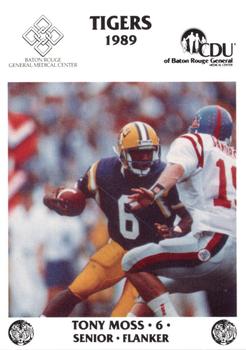
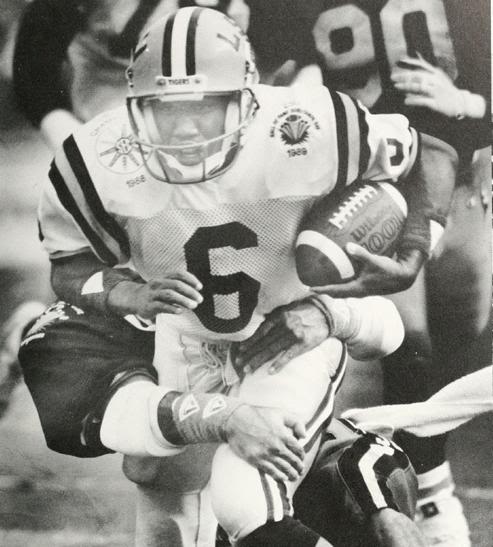
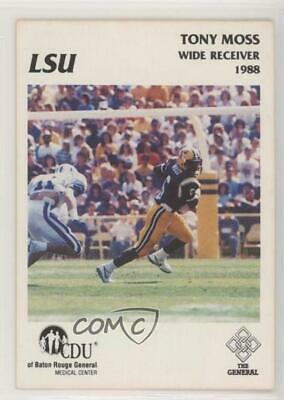
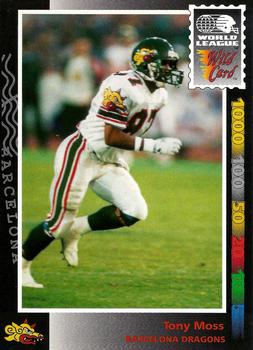
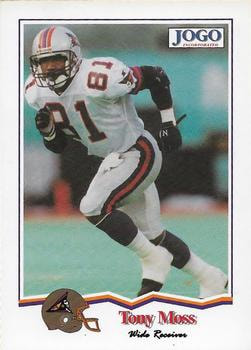
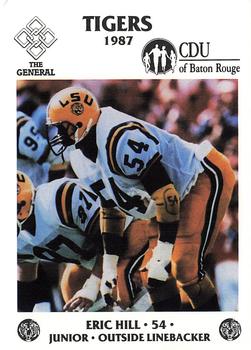
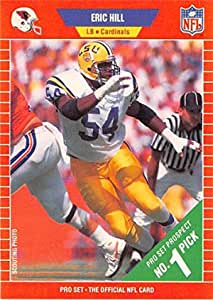
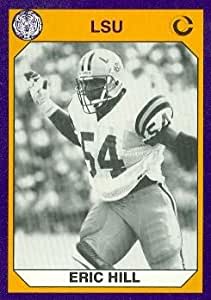
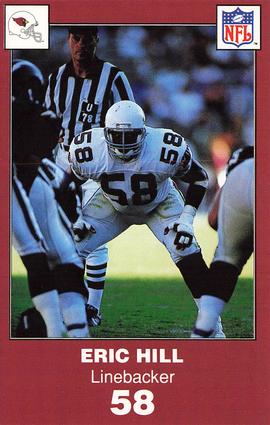
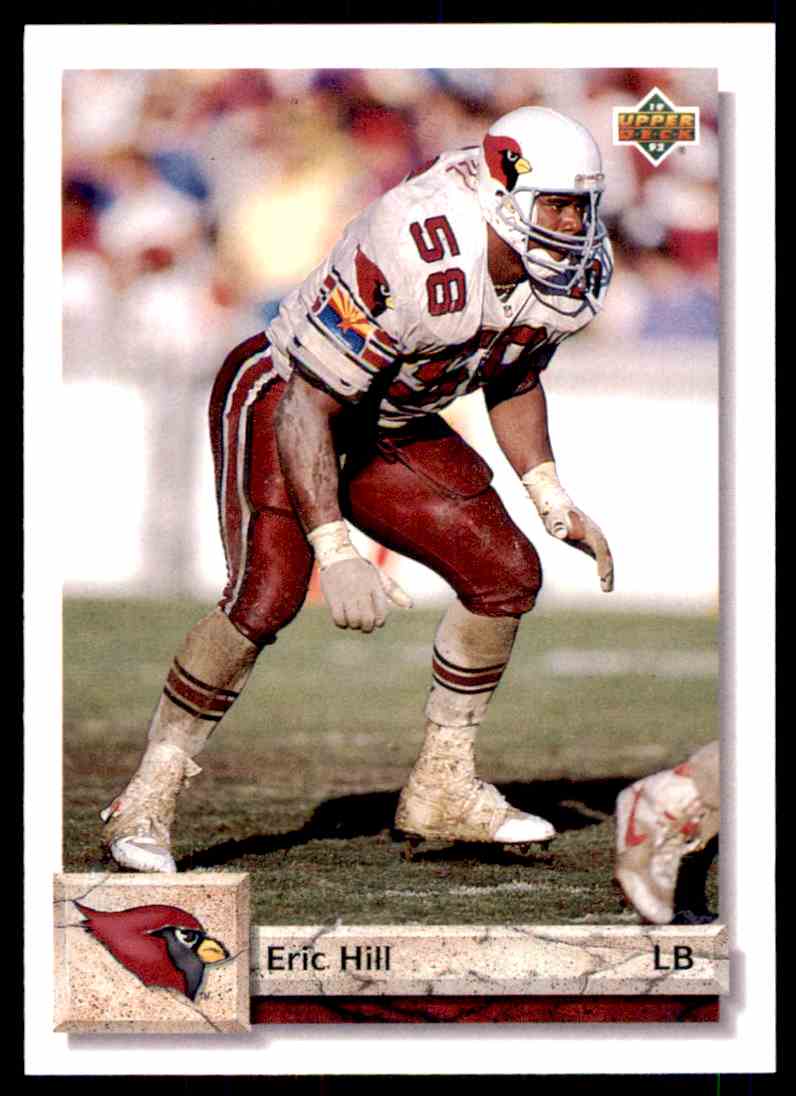
 RSS Feed
RSS Feed